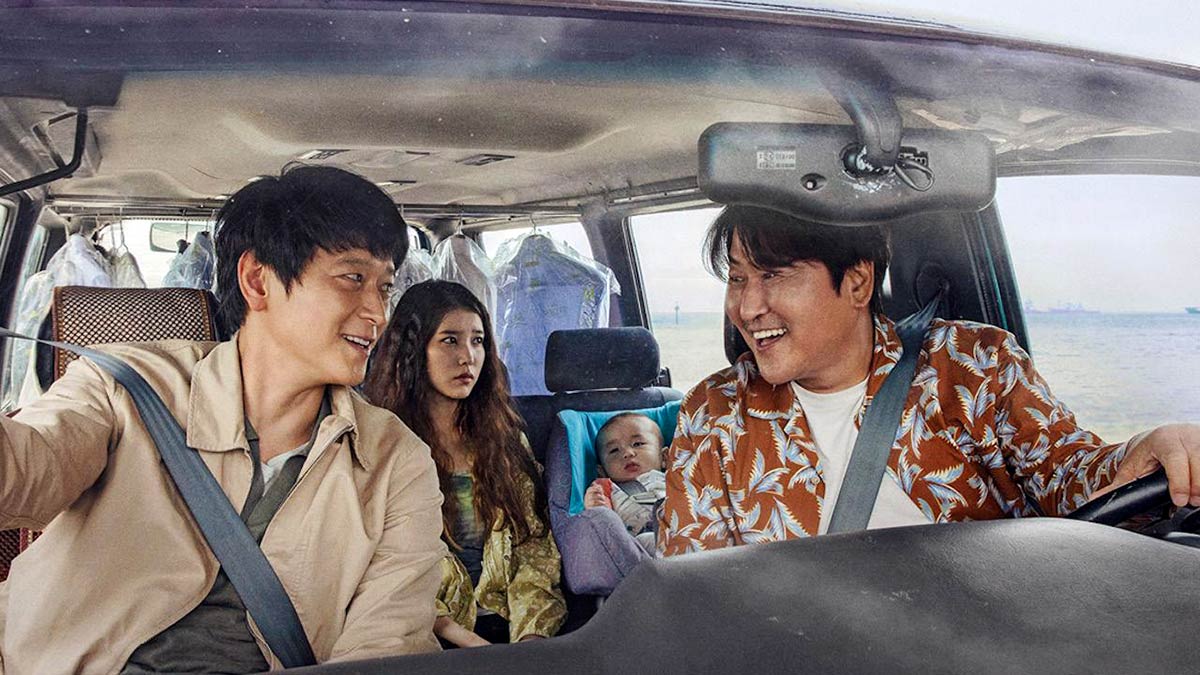In Hirokazu Kore-eda’s Palme d’Or winner “Shoplifters,” a group of small-time thieves forms their own makeshift family, living every day not only through pure survival instinct but a genuine love for each other. For his first film set in Korea, the Japanese filmmaker considers similar themes in “Broker,” a road trip odyssey reflecting on the family we choose and the family we tearfully let go of. Absorbing and heartwarming, it’s easy to forget that this tender drama is about human trafficking.
Of course, such a plot could never be that dark in Kore-eda’s hands. Through his research, the director became fascinated with “baby boxes,” a place where infants could be safely left by mothers. Outside a Busan church, So-young (Lee Ji-eun) abandons baby Woo-sung with a promise to return and a note without her name. Knowing that children left by parents who say they’ll come back for them are sentenced to life in an orphanage by law, laundry shop owner Sang-hyun (Song Kang-ho) and, Dong-soo (Gang Dong-won), a worker at the baby box facility, secretly take him away to sell him to desperate parents.
READ MORE: Cannes Film Festival 2022 Preview: 25 Must-See Films To Watch
But surprisingly, So-young does come back. Upon discovering that the pair will be paid a hefty sum of cash for Woo-sung, she joins them in their rickety van to find her son a new home. At the same time, a pair of cops, Su-jin (Bae Doona) and Lee (Lee Joo-young), quietly pursue them in the hopes of catching them in the act. At first, the police arc feels like an unnecessary plot addition in a film that’s mostly coasting along, but it pays off with the film’s devastating conclusion.
Naturally, the perennially charismatic Song Kang-ho leads the film’s ensemble with endless charm. But the film allows each one of its actors to have their moment including a young orphan who hitches a ride. Lee Ji-eun is particularly affecting as a hot-headed recalcitrant whose barriers gradually fall once she opens herself up to Sang-hyun and Dong-soo’s generosity. Like many of Kore-eda’s films, “Broker” finds faith in the kindness of others. Su-jin’s request for a new shirt to replace another with a broken button is placed in direct contrast to Sang-hyun repairing So-young’s own damaged dress without being asked. The simple act almost reduces So-young to tears, as she silently stares at the item of clothing in her hands,
“Broker” is far more complex than a blanket statement on abortion, something that viewers may feel so inclined to discuss with legislation being passed in the U.S. So-young squirms at the idea of aborting her child. Still, the very notion of being pro-choice is that it’s a woman’s decision whether she keeps her baby or not. Instead, the film is far more concerned with the children who get left behind and how they might wrestle with being unwanted. Ever grateful for the joys of life, however ephemeral, Kore-eda posits that there’s no such thing as rejection. In one of the film’s most crushing moments, So-young lies down in a hotel room occupied by orphans and outcasts and thanks each of her unlikely companions for being born.
There’s no criminality with these characters, only pure intentions. Kore-eda deals in his trademark sentimentality to explore how families can come in any configuration in a life lived on the outskirts. Trips to a theme park and a car wash cement how such bonds are made through shared experience and a willingness to open yourself up. Accompanied by Jung Jae-il’s wistful score of soft piano and guitar melodies, “Broker” is washed in a comforting warmth that never ceases, even in its most tear-inducing notes. Even the more shocking plot twists, including a murder, are softened by Kore-eda’s gentle touch.
“Broker” never rests on a simple conclusion about why So-young would leave her child. It instead considers the best course of action for moving on. When regret is unshakable, the only thing you have power over is preventing others from sharing that feeling. In one scene, So-young opens up about a dream she has in which rainfall washes away her past day, though once she wakes up, she realizes that, even though it’s still pouring outside, nothing about her has changed. “Do you need an umbrella?” Dong-soo asks. It’s emblematic of the small tokens of affection that slowly accumulate into a gut punch of empathy. It’s what Kore-eda does best. [A]
Follow along with all our coverage from the 2022 Cannes Film Festival.





